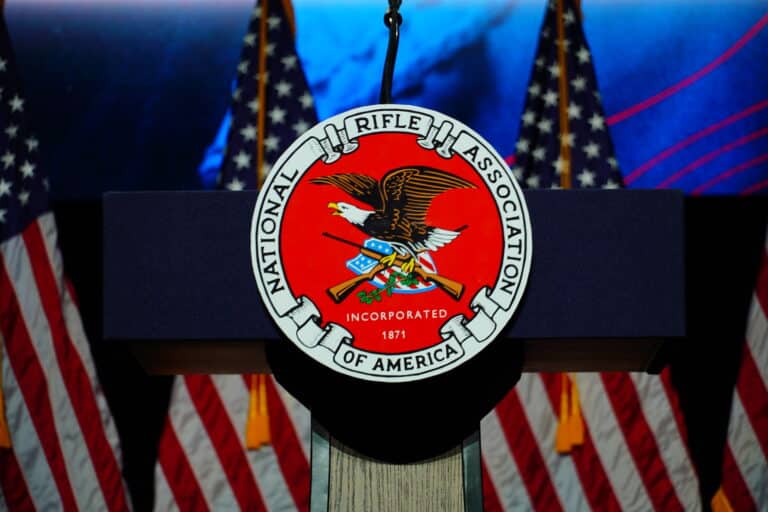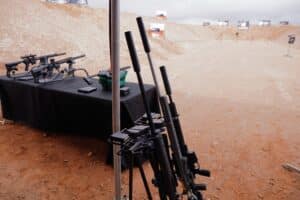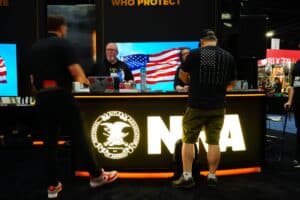Manhattan, New York — A jury will have to decide whether the NRA and its leaders were caught with their hand in the cookie jar.
At least, that’s how Monica Connell of the New York Attorney General’s Office put it in her closing remarks on Thursday. She accused the NRA, former CEO Wayne LaPierre, former Treasurer Woody Phillips, and current General Counsel John Frazer of either diverting tens of millions in NRA funds for lavish personal expenses or sweetheart deals for friends, covering up those expenses and arrangements, or failing to practice due diligence in preventing them from happening. She framed their defense as little more than ineffective excuse-making.
“They’re going to try to get you to think about anything except what happened to those cookies,” Connell said in the afternoon. “They’re going to point the finger at other people. They’re going to blame anyone else but themselves.”
The defendants had spent the morning trying to poke holes in Connell’s case and decrying the motivations of her boss, Attorney General Letitia James. Throughout that time, they cast doubt on the credibility of witnesses the AG relied on, including current and former NRA insiders, and claimed they’d instituted adequate reforms to rectify past mistakes. They also argued the case was primarily the result of a political vendetta James had made clear ever since she labeled the NRA a “terrorist group” while running for office in 2018.
“The fact is, Letitia James set out to destroy the NRA, and the best way to do that was to destroy Wayne LaPierre,” P. Kent Correll, who represents the former CEO, said.
The jury’s decision on whether the NRA and its leaders should be held liable over the accusations will determine the future of the nation’s largest gun-rights group and, therefore, the gun debate writ large. If they side with the AG, LaPierre and company will likely be stripped of their ability to work with the group and forced to pay it millions of dollars in restitution. But the NRA may also be subject to a court-appointed monitor, depending on what Judge Joel Cohen decided in the sentencing phase.
Judge Cohen started the week by whittling away some of the charges against the NRA. He granted a directed verdict for the individual defendants that eliminated charges based on a law intended to regulate trustees. He found those charges stretched the AG’s power too far and were mostly duplicative anyway.
He also tossed some related-party transaction charges, such as one dealing with LaPierre’s relationship with vendor David Mckenzie. The moves paired down the AG’s case similarly to when he dismissed her attempt to dissolve the organization. However, the bulk of the charges remained, and the judge told the jury to make sure they only focused on what was at hand.
“During the course of a case, claims come and go,” Judge Cohen said. “All you have to worry about is what’s before you now.”
The jury’s decision will probably come down, at least in part, to the line between mismanagement and malfeasance. They will have to wade through a myriad of questionable expenses, such as LaPierre’s business-related jet travel or overseas trips, and determine which, if any, cross the line into illegality. Similarly, the jury must decide who qualifies as a whistle-blower under New York law and what constitutes retaliation–a major sticking point between the AG and the NRA.
They’ll also have to evaluate whether efforts made by the NRA to institute new internal controls after the corruption allegations surfaced in 2018 or Wayne LaPierre’s last-minute million-dollar repayment to the group for some of the private flights he booked were genuine. Connell argued those efforts were not done in good faith, and, even if they were, they wouldn’t undo the NRA’s bad deeds.
“Ladies and gentlemen when you’re caught in the act, saying you’re sorry now, saying that you’ll do better, doesn’t mean you didn’t take the cookie,” she said.
Good faith was something of a theme among the defendants during closing arguments, too. NRA attorney Sarah Rogers said the board, which LaPierre and his allies have been accused of manipulating through underhanded election tactics, is filed with a diverse group of accomplished professionals. She said they have always carried out their duties properly.
“The NRA Board of Directors, which is the seat of the NRA’s corporate governance, acted in good faith and with ordinary care,” she said.
Bill Fleming, who represented Frazer, argued the NRA General Counsel operated in “unrelenting good faith.” He claimed Frazer tried to comply with the law and could have his life ruined by a guilty verdict in the civil case.
“I ask you to send him home with his good reputation, which he richly earned, intact,” Fleming, who seemed to be on the verge of tears, said in closing.
Seth Farber, who represented Phillips, argued his client never did anything to harm the NRA and didn’t benefit personally from the contracts he signed without oversight despite one involving a girlfriend and another being his own post-employment consulting deal worth $30,000 a month.
“Mr. Phillips did not breach any duty to the NRA at any time,” he said.
Phillips was central to many questionable contracts with related parties and less-than-transparent vendors. He was even caught on tape arranging a scheme to use a contractor to hide payments on luxury hotels from the NRA’s books. But, while Farber admitted Phillips may have violated NRA internal controls at points, he claimed he didn’t do anything illegal.
“There’s a difference between violating NRA policy and violating the law,” Phillips’ lawyer argues.
Correll, too, argued that LaPierre always operated in “good faith.” He said LaPierre went above and beyond in repaying the NRA for private flights he booked for family members. But he also defended the general use of private jet travel as prudent.
“The Attorney General has taken a position that the law prohibits people who work for non-profits from flying private,” Correll said. “It doesn’t.”
He pointed to the PGA Tour as an example. He claimed they require executives to fly private. Correll said LaPierre’s habit of flying private was necessary due to security concerns, but it was also part of an approach to spending large sums on flashy events to woo wealthy donors and celebrities to the NRA cause.
“He was a visionary. He understood influencers before influencers was a word,” Correll said. “He was a genius.”
He went on to praise LaPierre’s work in what he called a “360 review” of the organization’s practices. Correll said LaPierre understood the review might bring up things that made him look bad, but he pursued the course correction anyway out of a sense of duty to the NRA. Rogers also defended LaPierre in her closing, arguing the NRA kept him on for years after concerns about his lavish personal expenses were brought to light because he was committed to being part of fixing the group’s issues.
She also defended some of the issues with the group’s governance that persisted after the reforms were initiated, such as LaPierre taking the NRA into bankruptcy on his own authority and without informing most other members of leadership. She said that reforming an organization as large and old as the NRA takes time, comparing it to a sunrise instead of a light switch.
But Rogers maintained that whatever issues the NRA may have had, the group is well governed today and not in need of intervention from a politically-motivated Attorney General.
“I expect the court to tell you that to win on this claim, to cash that check, the government will have to show not just that the NRA made some business decisions that you might make differently but that the NRA failed as a trustee of its mission and its donations,” she said. “That is a high bar, and they can’t meet it.”
Connell dismissed the reform talk as mostly irrelevant.
“If a burglar stole something from someone’s home, got arrested, and said, ‘Hey, I’m sorry, here’s some of the stuff I took. I won’t do it again.’ Ok. That’s a positive step,” she said. “But that doesn’t mean they’re not responsible for the burglary.”
The jury will meet on Friday and begin deliberating on who is right.






